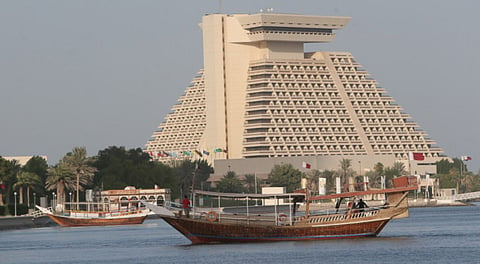Qatar set to adopt consensual foreign policy
New policies will be in a framework in line with Gulf states

Doha: Qatar is set to adopt a more consensual approach in its foreign policy under its new emir after the gas-rich Gulf nation rattled some of its neighbours with controversial support for Mohammad Mursi, the ousted former Islamist president of Egypt, and its backing of rebels in Syria.
As part of a global quest for recognition, Qatar has spent as much as $3bn over the past two years supporting the rebellion in Syria and has been the biggest donor to the political opposition. But its support for Islamist groups in the Arab world, including Egypt’s Muslim Brotherhood, has put it at odds with its neighbours.
Jarred by the military coup in Egypt that saw Mursi leave power, analysts say Qatar’s government, installed in July when the emir abdicated in favour of his son, Shaikh Tamim bin Hamad Al Thani, is rethinking its role in regional politics.
Doha’s backing of the Brotherhood in Egypt backfired when Mursi was ousted in July. The coolness in the relationship between the new regime and Qatar was highlighted earlier this month when Cairo returned the $2bn the Gulf state had deposited in its central bank following the failure of negotiations to convert it into a three-year bond.
Frayed relations became apparent during a trip by Khalid Al Attiyah, foreign minister, to Cairo in August, when he attempted to mediate between the military and Muslim Brotherhood but received short shrift.
Backers of the military coup in the Gulf remain suspicious of Doha’s longstanding links with the Brotherhood, pointing to the sanctuary provided to Islamist cleric Yousef Al Qaradawi and the funding of the Al Jazeera network, which is perceived to be pro-Brotherhood.
Lingering Saudi mistrust of Qatar became clear when Bandar Bin Sultan Al Saud, the kingdom’s internal security chief who is leading Saudi policy in Syria, was quoted describing Qatar as “300 people with a TV station”. The slight was apparently taken in good humour by Doha, where officials interpreted his intemperate comments as evidence of their continued influence.
Officials in Doha argue that Qatar’s backing of the Muslim Brotherhood was a way of accommodating the rise of Islamism across the region. Across the Gulf, there is also a recognition that Egypt’s story has yet to be played out. “Doha may be licking some of its wounds, but its own experience, as well as that of Turkey, also suggests that no country, even Saudi Arabia, can alone navigate the treacherous politics of the Arab world,” says Emile Hokayem, a regional analyst at the International Institute for Strategic Studies.
Indeed, analysts and diplomats play down the notion that Qatar will recede into isolationism under the new emir, especially with regards to Syria. Diplomats say Doha’s approach will become more consensual within the framework of common Gulf goals. “The new leadership will continue the same policy,” says one western official. “But with more mature engagement.”
Shaikh Tamim had several foreign affairs portfolios before his ascension to the throne. He organised arms supplies to Qatar’s rebel allies in Syria. As emir, he may have delegated that responsibility, but his personal experience will still carry sway, analysts say.
The crucial Saudi relationship was also entrusted to the 33-year-old Sandhurst graduate, who insiders say has over the past few years managed to ease some of the traditional tensions between Riyadh and Doha. Al Attiyah, the foreign minister, displays less bravura than his predecessor Shaikh Hamad bin Jassim Al Thani.
“There is a change in style but not in substance,” says one western official.
If anything, the growing Syrian crisis has renewed Qatar’s sense of purpose. In recent months Doha has taken a back seat to its larger neighbour Saudi Arabia in orchestrating the rebel offensive against the Assad regime in Damascus. Syrian opposition sources say now Saudis and other Gulf allies are working closely in operations rooms in Turkey and Jordan, co-ordinating the rebels’ campaign.
But Qatar’s foreign minister stood “shoulder to shoulder” with John Kerry, US secretary of state, when this month he attempted to win over public opinion for military action against the Al Assad regime. “What Qatar lacks in depth and breadth in comparison with Saudi Arabia, it makes up, arguably imperfectly, thanks to unity of purpose and effort,” says Hokayem.



